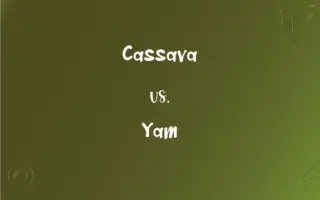Segment vs. Fragment: What's the Difference?
Edited by Harlon Moss || By Janet White || Updated on August 16, 2024
A "Segment" is a complete, self-contained portion of something, whereas a "Fragment" is an incomplete, broken piece, often implying irregularity or lack of wholeness. These words differ in the implication of completeness and wholeness.

Key Differences
A "Segment" and a "Fragment" are terms that are generally used to describe parts of a whole, but they diverge significantly in their nuances and connotations. A Segment typically refers to a part or section of something that is complete or self-contained, implying that it holds a certain level of wholeness and regularity within the context of the larger entity. It’s generally used in a more organized and structured context. Conversely, a Fragment is often seen as an irregular, incomplete, or broken piece of something larger. It may not hold significance or functionality on its own and generally implies a sense of incompleteness or irregularity.
Within various contexts, the term "Segment" can imply a structured and integral portion, like a segment of a population in demographic studies or a segment in geometry, where it is a part of a line bounded by two endpoints. This term often carries a sense of wholeness and regularity, representing a self-contained part that maintains its structure or integrity. On the other hand, "Fragment" is more frequently associated with broken, unstructured, or incomplete pieces, like a fragment of a shattered glass or a fragment of a sentence. It’s often used to imply that the piece is part of something larger and lacks completeness or regularity.
When considering the term "Segment" in linguistic contexts, it can refer to a complete and coherent part of a text or speech, holding distinct meaning or function within the linguistic structure. It is viewed as a self-contained and integral part of the discourse. In contrast, the term "Fragment" in linguistic terms denotes an incomplete or incoherent piece of text or speech, often lacking in full meaning or function. It doesn’t convey a complete thought and is dependent on the larger context for coherence.
In concluding, "Segment" and "Fragment" share a general relation as they both refer to parts of a whole, but their implications vary significantly. A Segment is viewed as a complete, structured, and coherent part of a larger entity, carrying a sense of wholeness and integrity. In contrast, a Fragment is perceived as an incomplete, broken, or irregular piece of a larger whole, conveying a sense of lack of wholeness and coherence.
Comparison Chart
Completeness
Represents a complete and self-contained portion
Represents an incomplete and broken piece
ADVERTISEMENT
Regularities
Usually regular and structured
Often irregular and unstructured
Functionality
Can be functional and meaningful on its own
May lack functionality and coherence on its own
Contextual Use
Used in more organized and structured contexts
Used to denote brokenness or incompleteness
Linguistic Role
Can be a complete and coherent part of a text or speech
An incomplete or incoherent piece of text or speech
Segment and Fragment Definitions
Segment
A distinct piece of a whole maintaining its structure.
The citrus segment was juicy and sweet.
ADVERTISEMENT
Fragment
A part broken off from a whole.
A fragment of the ancient pottery was discovered.
Segment
Any of the parts into which something can be divided
Segments of the community.
A segment of a television program.
Fragment
A piece representing lack of wholeness.
Only a fragment of the information was available.
Segment
The portion of a line between any two points on the line.
Fragment
An isolated or unconnected piece lacking coherence.
The conversation was filled with fragments.
Segment
The area bounded by a chord and the arc of a curve subtended by the chord.
Fragment
A small part broken off or detached.
Segment
The portion of a sphere cut off by two parallel planes.
Fragment
An incomplete or isolated portion; a bit
Overheard fragments of their conversation.
Extant fragments of an old manuscript.
Segment
(Biology) A clearly differentiated subdivision of an organism or part, such as a metamere.
Fragment
(Grammar) A sentence fragment.
Segment
To divide or become divided into segments.
Fragment
To break or separate (something) into fragments.
Segment
A length of some object.
A segment of rope
Fragment
To become broken into fragments
After the election, the coalition fragmented.
Segment
One of the parts into which any body naturally separates or is divided; a part divided or cut off; a section; a portion.
A segment of an orange; a segment of a compound or divided leaf
Fragment
A part broken off; a small, detached portion; an imperfect part, either physically or not
A fragment of an ancient writing
I heard a small fragment of the conversation.
Segment
(mathematics) A portion. Category:en:Shapes
Fragment
(grammar) A sentence not containing a subject or a predicate.
Segment
A straight path between two points that is the shortest distance between them.
Fragment
(computing) An incomplete portion of code.
Segment
(geometry) The part of a circle between its circumference and a chord (usually other than the diameter).
Fragment
(internet) A portion of a URL referring to a subordinate resource or anchor (such as a specific point on a web page), introduced by the
# sign.Anchor link
The URL
www.example.com/home#recent ends with a fragment.Segment
(geometry) The part of a sphere cut off by a plane.
Fragment
(intransitive) To break apart.
Segment
(topology) Any of the pieces that constitute an order tree.
Fragment
(transitive) To cause to be broken into pieces.
Segment
(science) A portion.
Fragment
To break up and disperse (a file) into non-contiguous areas of a disk.
Segment
(phonology) A discrete unit of speech: a consonant or a vowel.
Fragment
A part broken off; a small, detached portion; an imperfect part; as, a fragment of an ancient writing.
Gather up the fragments that remain.
Segment
(botany) A portion of an organ whose cells are derived from a single cell within the primordium from which the organ developed.
Fragment
A piece broken off or cut off of something else;
A fragment of rock
Segment
(zoology) One of several parts of an organism, with similar structure, arranged in a chain; such as a vertebra, or a third of an insect's thorax.
Fragment
A broken piece of a brittle artifact
Segment
(broadcasting) A part of a broadcast program, devoted to a topic.
The news showed a segment on global warming.
Fragment
An incomplete piece;
Fragments of a play
Segment
(computing) An Ethernet bus.
Fragment
Break or cause to break into pieces;
The plate fragmented
Segment
(computing) A region of memory or a fragment of an executable file designated to contain a particular part of a program.
Fragment
A small, broken, or irregular piece of something.
He found a fragment of glass on the floor.
Segment
(travel) A portion of an itinerary: it may be a flight or train between two cities, or a car or hotel booked in a particular city.
Fragment
An incomplete or disjoint piece of text.
The fragment of the letter was hard to understand.
Segment
(heraldry) A bearing representing only one part of a rounded object.
Segment
(ambitransitive) To divide into segments or sections.
Segment the essay by topic.
Segment
One of the parts into which any body naturally separates or is divided; a part divided or cut off; a section; a portion; as, a segment of an orange; a segment of a compound or divided leaf.
Segment
A part cut off from a figure by a line or plane; especially, that part of a circle contained between a chord and an arc of that circle, or so much of the circle as is cut off by the chord; as, the segment acb in the Illustration.
Segment
A piece in the form of the sector of a circle, or part of a ring; as, the segment of a sectional fly wheel or flywheel rim.
Segment
One of the cells or division formed by segmentation, as in egg cleavage or in fissiparous cell formation.
Segment
To divide or separate into parts in growth; to undergo segmentation, or cleavage, as in the segmentation of the ovum.
Segment
One of several parts or pieces that fit with others to constitute a whole object;
A section of a fishing rod
Metal sections were used below ground
Finished the final segment of the road
Segment
One of the parts into which something naturally divides;
A segment of an orange
Segment
Divide into segments;
Segment an orange
Segment a compound word
Segment
Divide or split up;
The cells segmented
Segment
A self-contained portion of something.
Each segment of the show features a different guest.
Segment
A part of a geometrical figure.
A line segment is bounded by two endpoints.
Segment
A section of a population sharing characteristics.
This product targets the youth segment of the market.
Segment
A coherent part of text or speech.
He focused on one segment of the conversation.
FAQs
Is a segment always complete in itself?
Typically, a segment is considered complete and self-contained within the context of the whole.
Can a segment be a portion of a population?
Yes, a segment can represent a specific portion of a population in demographic studies.
Can a fragment be part of a sentence?
Yes, a fragment can be an incomplete piece of a sentence, lacking in full meaning.
Is a segment always a large portion?
No, a segment can be large or small but is typically complete and coherent within its context.
Is a fragment necessarily irregular and broken?
Generally, a fragment is viewed as an irregular and incomplete piece.
Is a segment in geometry a structured part?
Yes, in geometry, a segment is a structured part of a line, bounded by two endpoints.
Can the term segment refer to a piece of an orange?
Yes, the term segment can refer to a self-contained piece of an orange.
Can a fragment of text convey complete information?
Generally, a fragment of text lacks completeness and doesn’t convey full information.
Are fragments in writing considered incorrect?
In formal writing, fragments are usually considered incorrect as they lack completeness.
Can a segment of text convey a complete thought?
Yes, a segment of text typically conveys a complete and coherent thought.
Can a fragment represent a piece of broken glass?
Yes, a fragment can represent a small, broken piece of glass.
Can fragments form a whole when pieced together?
Yes, fragments can potentially form a whole if pieced together correctly.
Are segments used in data analysis?
Yes, in data analysis, segments are used to represent specific, coherent parts of the data.
Is a fragment considered as lacking coherence?
Often, a fragment is considered as lacking coherence and full meaning on its own.
Can a market be divided into various segments?
Yes, a market is often divided into various segments based on demographics, behaviors, etc.
About Author
Written by
Janet WhiteJanet White has been an esteemed writer and blogger for Difference Wiki. Holding a Master's degree in Science and Medical Journalism from the prestigious Boston University, she has consistently demonstrated her expertise and passion for her field. When she's not immersed in her work, Janet relishes her time exercising, delving into a good book, and cherishing moments with friends and family.
Edited by
Harlon MossHarlon is a seasoned quality moderator and accomplished content writer for Difference Wiki. An alumnus of the prestigious University of California, he earned his degree in Computer Science. Leveraging his academic background, Harlon brings a meticulous and informed perspective to his work, ensuring content accuracy and excellence.








































































